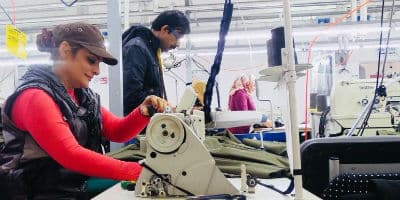As part of Better Work Jordan’s Gender Strategy, we are committed to reporting the voices of those contributing to the promotion of fairness and equality within the garment sector. The story below belongs to a collection of articles set to highlight women’s rich and varied experiences within the local industry and the efforts of those working to promote gender equality across the factory floor.
Raeda Abu Halawa is a Jordanian woman working as a mechanic in the Better Work Jordan-affiliated Tusker Apparel satellite factory, a small branch located some 30 kilometres from the capital Amman. Here, unemployment runs high and women face a vast array of difficulties to access the workforce.
Raeda, the first woman mechanic in Jordan’s garment industry
Raeda Abu Halawa, walks down the factory floor, takes in the production line and smiles at colleagues.
“Planned maintenance is key to increase productivity,” she says, while carefully looking at the factory’s maintenance schedule.
Surrounded by machine drivers and tools, Raeda looks in her element.
“I am a curious person. My brain thrives on logic and puzzles,” the 50-year-old from Amman says. “I always loved getting things fixed.”

In a country where unemployment runs high and opportunities for women are limited, Raeda sets a precedent.
She began her job as a maintenance technician in a Jordan’s garment satellite unit in 2017. Though the garment sector is traditionally dominated by female machine operators, Raeda has become the first female mechanic across the country’s industry.
“My name means leader in Arabic,” she says. “This is how I see myself, a leader who is not afraid of trying.”
Though more women than men attend university in the Kingdom, several obstacles prevent them from joining the local workforce. Limited access to transportation, family responsibilities, lack of childcare facilities, and conservative traditions still heavily affect Jordanian women’s career paths today.
This was Raeda’s case.
Following the birth of her first child, she gave up her dream of becoming a social science teacher. The absence of nurseries in the neighbourhood meant no one could tend to the baby while she was busy at work.
Despite the difficulties, Raeda never let go her love for teaching. As she was raising her six children, she volunteered in the local community centre, giving classes to underprivileged children.
But in 2014, her life changed.
She joined a USAID training project on water pump maintenance and management. The programme aimed to provide women with home-maintenance skills to help them find part-time jobs within the community.
“Everyone in my family was so supportive, especially my husband,” Raeda says. “I still remember how my youngest child walked into school talking about my new job with teachers and schoolmates.”
Shortly after, Raeda began training women from the area on water management and maintenance issues. She used this opportunity for networking and learning further technical skills.
At this point, Raeda realized how crucial employment had become to her life.
“I felt stronger and more confident,” she says. “Through the interaction with colleagues and the exercise of my technical skills, I learnt how to raise my voice both at home and in the workplace. I wasn’t ready to let this freedom go after the end of the programme.”
While relentlessly looking for job opportunities, Raeda eventually joined Tusker factory as a machine operator in 2016.
Soon, the manager noticed her maintenance skills. Colleagues would often ask her to to replace their sewing machine oil and filters and fix mechanical glitches in the production line.
Following a training on the maintenance of garment machines, Raeda joined the factory’s technicians in their daily tasks.
“My two male colleagues were incredibly supportive throughout this process,” she says. “Abu Hamid, the most experienced one, was always pushing me to implement the most challenging repairs. He believes women can do this job thanks to their strong sense of discipline and attention to details.”
Taboos and societal norms should no longer keep women from realizing their potential, Raeda says, adding that male views on non-traditional form of employment for women has changed tremendously over the past decade.
“Given the current economic situation, life is no longer easy in Jordan,” she says. “Men and women should work together to earn a living and share household responsibilities.”
Raeda strongly believes in women’s individual and collective potential.
“What excites me the most about my job is interacting with my colleagues, sharing experiences, and helping each other out,” she says. “Nothing is hard for us, women. We can take up any challenges to build a better future for ourselves and our loved ones.”
Although women represent around 80 per cent of the workforce in the garment sector worldwide, they are concentrated in the lowest-paying, lowest-skilled occupations. Gender-based discrimination during recruitment processes and sexual harassment in the workplace remain widespread. Social norms and the predominance of working mothers also contribute to a sizeable gender pay gap, with female factory workers earning up to 21 per cent less per hour than their male counterparts.
Better Work’s gender strategy aims to unite partners from the public and private sector to address these issues in four ways: by working to reduce discrimination and sexual harassment; promoting sexual and reproductive health and rights, maternity protection and work-life balance; increasing representation of women in worker and employer committees and organizations; and, helping women develop career opportunities.
Better Work – a collaboration between the United Nations’ ILO and the International Finance Corporation, a member of the World Bank Group – brings together all levels of the garment industry to improve working conditions and boost the competitiveness of apparel businesses.